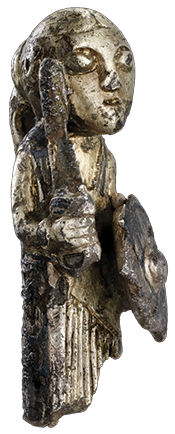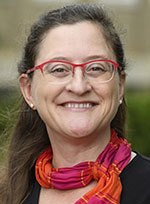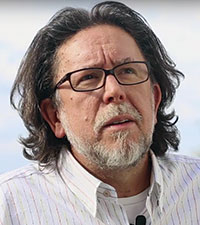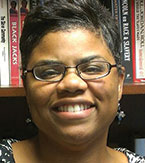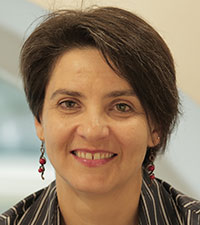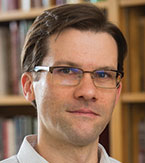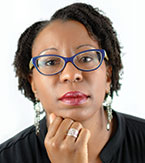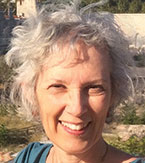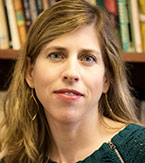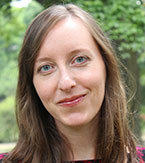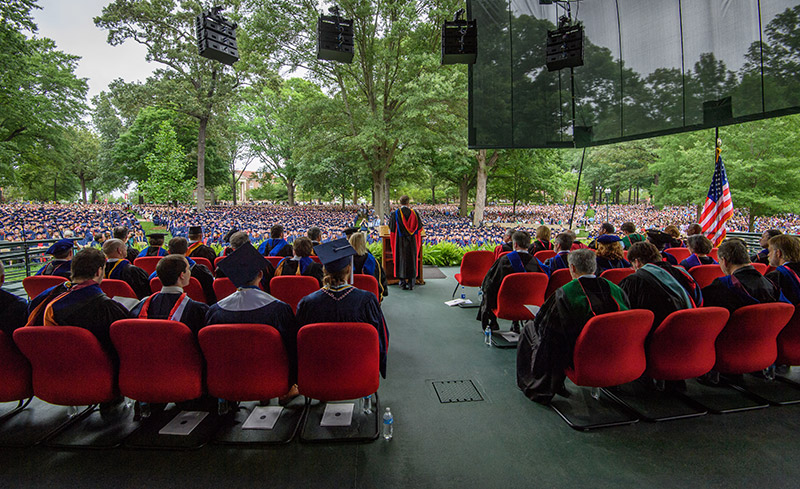
“Achievements and rankings reinforce our flagship status and are a testament to the value of our degrees, the impact of our research, and the competitiveness of our students, staff, and faculty. While they provide important benchmarks for our university, we remain committed to achieving even higher levels of excellence.”
—Chancellor Jeffrey S. Vitter
In recognition of the University of Mississippi and the College of Liberal Arts’ new momentum in the mission to lead the way in learning, discovery, creativity, and engagement for the state and country, we are ranked among the nation’s best public institutions by several organizations.
The View from Ventress highlights a few of these ratings and examples of how the College contributes to academic excellence through faculty productivity and recognition, graduate programs, and undergraduate experiences.
“It is an honor for our university to achieve Carnegie R1 status as a result of our high caliber faculty and students,” said Lee M. Cohen, dean of liberal arts. “I am fortunate to work alongside these talented individuals daily, and I am committed to help our College reach even greater heights. It is exciting to be part of this community of scholars, and I look forward to what lies ahead.”
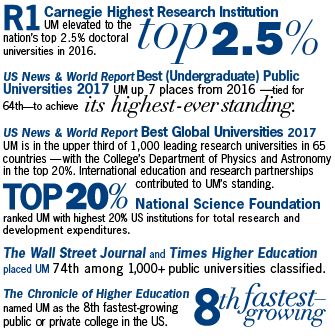
College Faculty
UM’s increased status draws heavily on the quality of faculty research and creative activities; state, national, and international recognition and awards; and external grants received.
International collaborations
Numerous faculty members work with colleagues around the world. One stand-out is the Department of Physics and Astronomy.
US News & World Report’s 2017 listing of Best Global Universities ranks the department number 11 for overall international collaborations and number six for publications that are among the 10% most cited.
“The physics department’s worldwide reputation and competitiveness have increased in recent years because of the quality of our research and our strong global collaborations. We attract high-quality faculty and graduate students with international backgrounds,” said Luca Bombelli, chair and associate professor.
“The UM experimental high-energy physics group participates in the Belle II experiment at the SuperKEKB collider in Tsukuba (Japan), the CMS experiment at CERN’s Large Hadron Collider near Geneva (Switzerland), and the Muon Ionization Cooling Experiment at the Rutherford Appleton Laboratory near Oxford in the United Kingdom. In July, approximately 40 scientists attended UM’s 3rd Annual Belle II Physics Summer School.
“Our physicists Marco Cavaglià and Kate Dooley and some of their students are part of the LIGO Scientific Collaboration, which first detected gravitational waves in 2015. In June of this year, LIGO reported the detection of gravitational waves produced by the merger of a third pair of black holes. As the number of detections increases, our understanding of processes involving this extreme type of astrophysical objects is advancing rapidly.”
One collaboration brought 50 top international scientists to Oxford for a four-day workshop on the latest in gravitational-wave astronomy with support by UM physicist Emanuele Berti’s National Science Foundation CAREER Award and the Marie Sklodowska-Curie Research and Innovation Staff Exchange Action Network, funded by the European Union.
New Scholar Awards
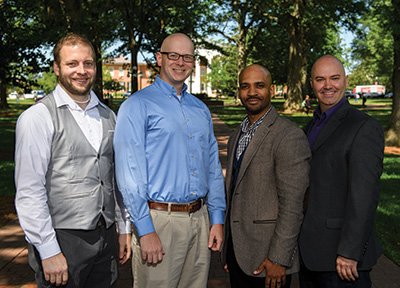
Jared Delcamp, Joshua Hendricks, Derrick A. Harriell, and Matthew R. Wilson received the 2017 College of Liberal Arts New Scholar Award.
Four faculty members are inaugural recipients of the New Scholar Award from the College of Liberal Arts.
“The College recruits some of the very best young faculty in the nation,” said Charles L. Hussey, associate dean for research and graduate education and professor of chemistry and biochemistry. “They will no doubt prove to be academic leaders in their discipline.”
Matthew R. Wilson, assistant professor of theatre arts, is recognized for his published works, acting, directing, and fight choreography with three Best Director awards from the DC Metro Theatre Arts and the Excellence in Direction award from the Kennedy Center American College Theatre Festival among other accolades. “I travel to conferences and other universities to perform my ‘The Great One-Man Commedia Epic’ and to lecture on the history and theory of Italian Renaissance masked comedy, Commedia dell ‘Arte.”
Joshua Hendrickson, assistant professor of economics, has 16 papers published in highly rated academic journals in his fields of monetary theory, history and policy, and business cycles. His blog “The Everyday Economist” is recognized as one of the best by The Intelligent Economist. “My recent work examines how inflation affects the production decisions of firms and whether low interest rates can potentially cause boom-bust cycles in investment.”
Derrick A. Harriell, assistant professor of English and African American Studies, received the Mississippi Institute of Arts and Letters Award for promoting poetry as a tool for critical thinking and a force to inspire young people. His books of poetry achieve national visibility. Harriell’s second poetry collection highlights celebrated heavyweight African American boxers. “My third collection investigates my own past, as well as my adjustment to Mississippi and the South.”
Jared Delcamp, an assistant professor of chemistry and biochemistry and National Science Foundation CAREER awardee, created a first-class synthetic organic chemistry laboratory that generates dyes for solar-to-electric energy conversion. “We offer new materials that can be competitive with traditional solar cells while maintaining the cost advantage. So far, my team owns a number of records in this field, and we look forward to breaking them soon.”
Grants
The National Science Foundation CAREER program provides five years of grant support for career development of outstanding young scholars.
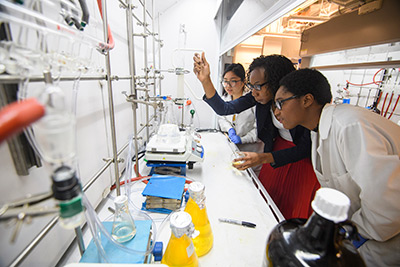
Dr. Davita Watkins (center) in her lab with students Duong Ngo and Briana Simms
Davita Watkins, assistant professor of chemistry and biochemistry, explores the operational efficiency of functional materials—ranging from solar-harvesting polymers to nano-sized therapeutic drug delivery systems. Efficiency depends upon two factors: the nature of the constituting components (i.e., molecules) and the arrangement of those molecules to yield a useful overall composition.
“The ability to control these molecules and understand their organization into discrete nanoscale arrays that exhibit unique properties affords transformative advances in chemistry and material science,” she said. “My research will establish guidelines towards developing molecules that absorb natural energy and produce/conduct electrical current. These molecules are unique in that they are programmed to self-organize and form structures that enhance those light-harvesting properties.”
The knowledge gained from Watkins’ research will lead to the development of more efficient organic-based materials and devices, thereby advancing the pursuit of technological applications (e.g., electronic devices and biomedical implants). Additionally, the project affords opportunities to technically train the next generation of scientists and engineers, particularly women and minorities.
Watkins acknowledges her position as a role model for future scientists of color. “I hope to inspire my young scholars to chase after the science that excites them and always thank those who paved the way for them to do so.”
Graduates
Strong graduate programs are essential to the research and teaching missions of the College. The number of graduates, particularly in doctoral programs, and quality of the graduate programs are important to UM’s top national rankings.
The College created two new graduate programs this year. Both offer something new in the state of Mississippi—a PhD in second language studies and a MFA in documentary expression.
PhD in Second Language Studies
This fall, the Department of Modern Languages is offering its first doctoral degree, a PhD in second language studies.
“We aim to train language professionals to meet certain needs today in education and in the private sector,” said Daniel O’Sullivan, interim chair of modern languages and professor of French. “There is an increasing need for people to administer language programs. Also, companies with international business require a cadre of language professionals to help train their workers.”
The degree program has two tracks. One track in applied linguistics is geared toward understanding empirical data about languages, the evolution of languages, and various dialects in the media and across the nation, among other aspects.
The second track is in Spanish and focuses on meeting the growing demand for professionals and academics who understand the language and culture of Spanish-speaking communities.
“The degree will prepare students to be leaders locally, regionally, nationally, and internationally,” said Felice Coles, the program’s graduate coordinator and a professor of modern languages. “Using their valuable and marketable skills, our PhD graduates will happily find jobs in education, government, and industry.”
MFA in Documentary Expression
The Center for the Study of Southern Culture’s new Master of Fine Arts in Documentary Expression emphasizes the skills—observing, listening, storytelling, and understanding context and multiple perspectives—central to the Southern Studies program. It provides the intersection of documentary skills and scholarly approaches so students already holding advanced degrees can conceptualize and complete documentary projects of exceptional quality.
“We live in an age in which technology allows all of us to be documentarians,” said Ted Ownby, Center director and professor of history. “One could make a good argument that documentary skills represent a new type of literacy. So this MFA degree will bring together people who already know how to study social and cultural issues and turn them loose to do great things.”
The new program teaches students documentary methods within the cultural studies framework that the Center has developed for decades, said Andy Harper, Southern Documentary Project director. “It recognizes and combines a few of the things we do best and allows us to pass those skills on to a new generation of storytellers.”
Undergraduates
From freshman year to senior research projects and individual creative works, UM undergraduates find a myriad of ways to express their individuality and challenge themselves. The 2016–17 academic year saw the largest and most academically accomplished freshman class in university history.
Stamps Scholars
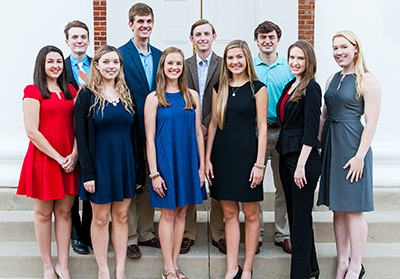
Among the 2017 recipients of the Penelope W. and E. Roe Stamps IV Leadership Scholarship at the University of Mississippi are (from left) Anna Daniels, James Asbill, Michaela Watson, R.G. Pickering, Nikki Sullivan, Ben Bradford, Sally Boswell, Tom Fowlkes, Summer Jefferson, and Eveanne Eason.
One measure of the outstanding freshman class is the record number of Stamps scholars. Twelve incoming students selected for their academic merit, leadership, and service made UM one of only four universities nationwide to attract more than 10 freshman class Stamps scholarship recipients. The Stamps Family Charitable Foundation selected 209 students from a pool of more than 400,000 applicants for their 2017 cohort. The scholarship covers the full cost of attendance plus $12,000 for unique educational pursuits such as study abroad, research expenses, and academic conferences.
Eleven of the 12 students are pursuing a degree program in the College of Liberal Arts, with majors in anthropology, biological science, chemistry, international studies, linguistics, psychology, and public policy leadership.
“It’s amazing to have access to some of the greatest minds at this university,” said Stamps scholar Heath Wooten, a linguistics major. “I’ve been put in a group of undergraduates who push my boundaries and make me aware of unique points of view. It’s an intensely well-rounded undergraduate experience.”
Read more stories about Stamp Scholars:
UM Stamps Scholars Freshman Class Is Nation’s Third-Largest
Six Inaugural Stamps Scholars Reflect Upon UM Experience
Call to Action
Friends and alumni can advance the mission of the College and maintain the upward momentum of the UM prestige and reputation. Consider giving funds for student scholarships, graduate fellowships, faculty development, and new technology and facilities. Larger graduate stipends attract more and higher quality students, which boosts faculty research, increases state funding, provides higher quality teaching assistance, and helps maintain UM’s new R1 Carnegie Classification status. Faculty development funds progress research and creative activities and provide opportunities for students to engage by opening a new world of possibilities. Classroom renovations allow more flexible spaces to encourage collaboration and active learning. State-of-the-art facilities help support the College mission, and simply put, make us feel good to be at Ole Miss.
MAKE A GIFT NOW
